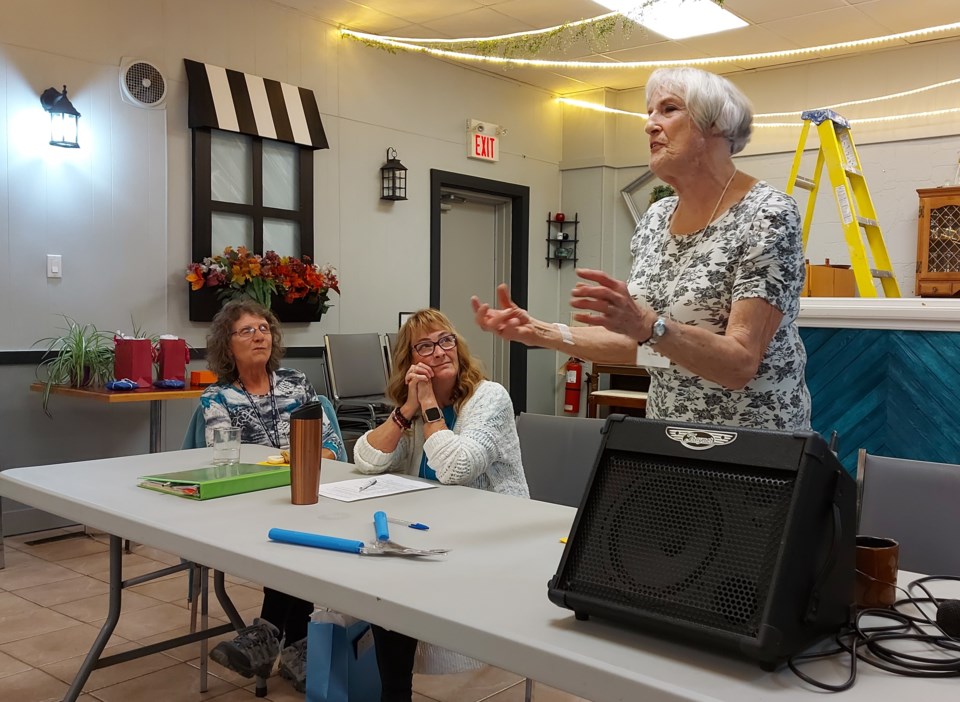Northern Ontario gardeners received helpful tips on how to achieve successful landscaping at a recent meeting of the Elliot Lake Horticultural Society.
Judy St. Dennis, who has gardened in Elliot Lake since 1996 and is a retired professional landscaper, gave a presentation at the general meeting of the horticultural society at the Masonic Heritage Hall on Sept. 27.
She said winter is the time for planning next year’s garden but gardeners need to take lots of photos of their gardens now, when there isn’t three feet of snow on the ground, because they won’t remember details later on. She also encouraged taking lots of notes.
“Ask yourself and think about how much sun is in your garden,” she said. “How much shade, morning or afternoon sun, full sun at 6 to 8 hours per day, partial shade or full shade.”
“Look at your site, is it windy? Is it exposed on the top of a hill? Is it flat or sloped? What are the existing features? Trees, big or small, man-made steps, structures, shrubs, perennials – keep or remove?”
St. Dennis told gardeners to keep track of their successes and failures.
When it comes to design, St. Dennis said to consider what you would like to see in your garden. “You want to have nice views looking out of the windows of your home, so use screens to hide the ugly things, like garbage cans and air conditioners. Other things to consider when planning your landscaping design is privacy, neighbours, and visiting dogs.”
She suggested selecting the style of your landscaping to accent your house. If modern, use rectangular or square flower beds. If your home is older, or cottage-like, you can use roses, flowering bushes and English garden styles of planting.
“Decide how much time you want to spend on maintenance,” said St. Dennis. “With design, you can cut down a great deal on maintenance.”
She stressed the need to make careful plant choices. Research and decide what kind of plants you think you want to buy, and make sure they are designated for Zone 4, Northern Ontario. Avoid spontaneous purchases at the garden shop. Plants aren’t cheap. Read the plant labels for cold hardiness, temperature range, maximum height and width of the mature plant.
“If the label says “spreads rapidly,” don’t buy it,” said St. Dennis, “because it will take over your garden.”
She encouraged gardeners to use native plants, as they are pest-free, trouble-free, don’t need a lot of work, and attract local pollinators. She said she buys trilliums from a nursery. “Don’t go dig them up in the wild as they are protected.”
When getting rid of unwanted plants, she asks that gardeners don’t throw plants into areas where they can escape or take over, such as invasive plants. She uses black plastic and mulch to rid an area of unwanted plant growth. “Everything underneath it breaks down.” For mulch, she uses leaves and says it is better than chemical fertilizer. But she warns gardeners not to use diseased leaves or plants for mulch as the disease will spread to new plants. She says she avoids using eggshells in compost because they attract raccoons.
St. Dennis said it’s okay to be a lazy gardener. “We sometimes spend too much time being perfect in our gardens.” She says to go for the overall experience; no one is going to look at your garden with a microscope. She said a friend told her years ago that you should always weed the front of your flower beds really well, then people just assume the back portions have been weeded.
